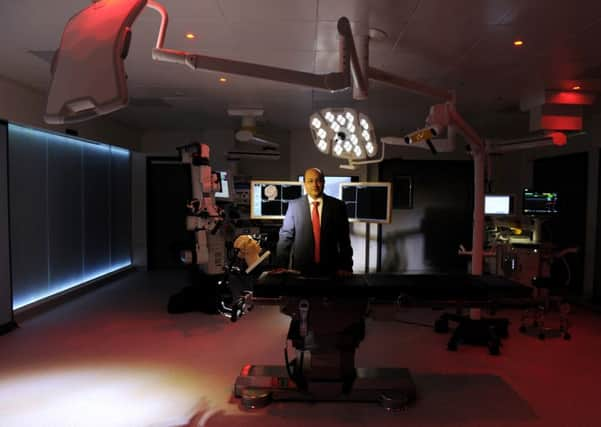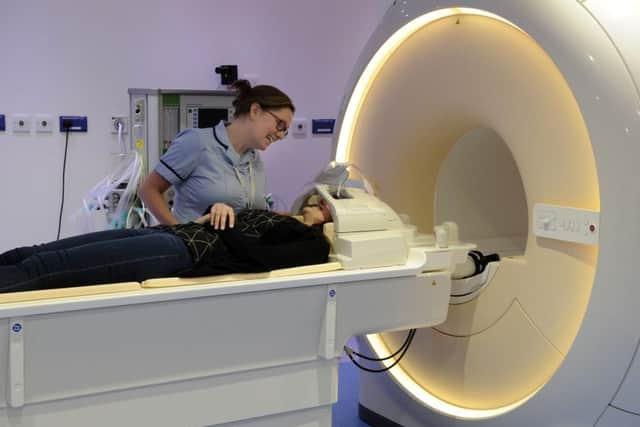'˜Sea-change' for brain tumour treatment as Yorkshire hospital welcomes revolutionary MRI scanner


In what has been hailed as a “sea-change” for treatment, which could be key to driving up survival rates, a new inoperative MRI scanner - the first in England - is now being used at Sheffield Children’s Hospital.
The £2.3m piece of technology can be used with brain mapping equipment so that surgeons can determine whether they have managed to remove all of a brain tumour while still in theatre.
Advertisement
Hide AdAdvertisement
Hide AdThey can also work out precisely where a tumour is, thereby ensuring surrounding healthy tissue is not damaged.


Hesham Zaki, head of the department of paediatric neurosurgery, said the equipment puts the Sheffield hospital at the forefront of increasing survival rates from brain tumours in the UK and worldwide.
He said: “The fact we can use the MRI scanner during the surgery is a real step-change.
“We scan the patient that we are operating on with their skull still open and the operation still ongoing.
Advertisement
Hide AdAdvertisement
Hide Ad“The MRI images mean that we can be sure the tumour has been completely removed and nothing has been left behind before we finish the operation.


“This is important because some types of brain tumour can look like normal brain.”
Mr Zaki said children’s survival from brain tumours “is almost entirely dependent on whether the surgeon is able to remove all of the tumour”.
He said complete removal means there is a 70 per cent to 80 per cent chance of long-term survival.
Advertisement
Hide AdAdvertisement
Hide Ad“But if we leave some behind, this can drop to as low as 40 per cent,” he said.
Since it opened six weeks ago, two large tumours in two children have been removed. The youngest patient was three years old.
The new MRI machine is the star attraction of its new theatre suite, but the wider investment, thanks to the Sheffield Children’s Hospital Charity, also includes measures taken to ensure children are as relaxed as possible for routine and follow-up MRI scans.
It uses dynamic lighting, projection and sound to help young patients feel more at ease - removing the need for a general anaesthetic - even projecting beach scenes or cartoon characters onto walls.
Advertisement
Hide AdAdvertisement
Hide AdMr Zaki, said: “Children come the week before their scan and choose a character, which they can then scan themselves. When they come back, the room has been turned into a welcoming environment with the character of their choice taking centre stage.
“It means the child is much more likely to stay still in the scanner and therefore reduces the need to do MRI scans under general anaesthetic.”
Eight-year-old Jack McGuigan, from Sheffield, was born with a condition called Langerhans’ cell histiocytosis (LCH), which causes growths of bone in his body. He requires MRI scans to determine where the growths are appearing - a scary process which he usually has under general anaesthetic, as he needed to be perfectly still throughout the scan.
Now using the new MRI suite, his mum Terri-Ann can be there and he can watch a DVD to stay relaxed while having the scan.
Advertisement
Hide AdAdvertisement
Hide AdShe said: “It’s a lot less intimidating, even for me. I had the room to stay in there with him and he could be awake the whole time. I can’t believe the difference.”
Jack said: “It didn’t feel scary at all. It reminded me of a posh speaker.”
Every element of the design of the two theatres that make up the new suite have been made to help the experience be less intimidating. Artfelt, the Children’s Hospital Charity’s arts programme, commissioned art to feature on each wall providing distraction and comfort, while a mobile hangs in the new atrium.
The first patient to be scanned using the new equipment was 16-year-old Ebony Taylor, from Bentley in Doncaster, who has been treated at the hospital for epilepsy since 2012.
Advertisement
Hide AdAdvertisement
Hide Ad“The old MRI scanner made such a horrible noise – I can’t describe it” said Ebony. “I was nervous coming to use this one but it was so good. You can hear the TV for a start, it wasn’t as claustrophobic and it was just more relaxing with all the lighting.”.
The new MRI machine has been paid for after a fundraising appeal by the Children’s Hospital Charity. It still needs to raise £500,000 to pay for the machine, but suppliers agreed to deliver it early so not to delay patient care.
David Vernon-Edwards, director of The Children’s Hospital Charity, said: “This life-saving scanner is a testament to the generosity of our supporters and will ensure our patients have access to the best possible equipment to help them get better more quickly.”